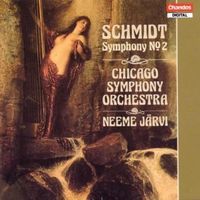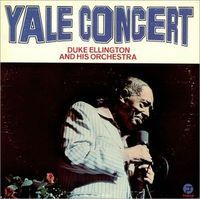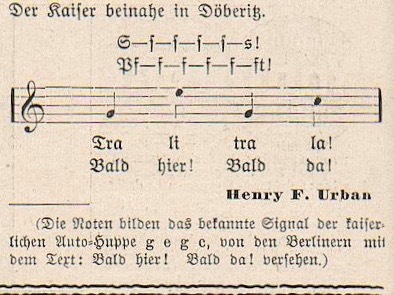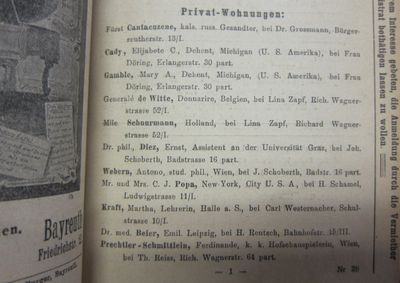Alex Ross's Blog, page 114
September 5, 2015
The Kaiser's Wagner-honk
Adorno, in his Versuch über Wagner, states that Kaiser Wilhelm II's auto-horn honked a motif that was a "simplification of the Donner-motiv from the Ring." After a somewhat exhaustive search, I found a notation of the horn-call in the Münchner illustrierte Wochenschrift für Kunst und Leben, of 1911. I haven't tracked down any contemporaneous sources linking Wagner to the Kaiser-Hupe, which was well known in the streets of Berlin and elsewhere, but the intervals of Donner's "Heda! Hedo!" are indeed there. As Henry F. Urban's text notes, Berliners heard the motif as "Bald hier, bald da" ("Here today, gone tomorrow"). The Kaiser was somewhat infatuated by Wagner in his youth, although he never warmed to the atmosphere at Bayreuth and ultimately took more enjoyment in lighter music, not to mention cars. It may be pure coincidence that a falling major sixth and rising fourth also appear in George M. Cohan's famous WWI song "Over There." In a fine display of historical irony, Erich Wolfgang Korngold interpolated that tune into his magnificent Symphony in F-sharp, written in memory of Franklin Delano Roosevelt.
Schmidt's Second
 On the topic of neglected symphonies, Gavin Plumley, in the Guardian, gives a nuanced portrait of Franz Schmidt, in advance of a Proms performance of his Second Symphony, and Bob Shingleton adds another plea in favor of "Forgotten Music." I've loved the Schmidt Second since hearing the astounding live recording by Neeme Järvi and the Chicago Symphony, released by Chandos in 1992. This is one of those symphonies, like the Tubin Fifth, in which you essentially wait for one stupendous moment; Schmidt's coda is obviously inspired by the ending of Bruckner's Fifth, but déjà vu is rarely more glorious. What's wonderful in the Järvi recording is the sense of the great Chicago players discovering and exulting in an unfamiliar score: it's a wordless argument for diversifying the repertory. I wrote about Schmidt, Zemlinsky, and Schreker for the New York Times in 1993; I remain proud of having described one passage in Schreker's Der ferne Klang as a "midnight dance of the orchestration manual." I had recently read Adorno's marvelous essays on Zemlinsky and Schreker in Quasi una Fantasia. Unsurprisingly, Adorno seems to have had no time for Schmidt.
On the topic of neglected symphonies, Gavin Plumley, in the Guardian, gives a nuanced portrait of Franz Schmidt, in advance of a Proms performance of his Second Symphony, and Bob Shingleton adds another plea in favor of "Forgotten Music." I've loved the Schmidt Second since hearing the astounding live recording by Neeme Järvi and the Chicago Symphony, released by Chandos in 1992. This is one of those symphonies, like the Tubin Fifth, in which you essentially wait for one stupendous moment; Schmidt's coda is obviously inspired by the ending of Bruckner's Fifth, but déjà vu is rarely more glorious. What's wonderful in the Järvi recording is the sense of the great Chicago players discovering and exulting in an unfamiliar score: it's a wordless argument for diversifying the repertory. I wrote about Schmidt, Zemlinsky, and Schreker for the New York Times in 1993; I remain proud of having described one passage in Schreker's Der ferne Klang as a "midnight dance of the orchestration manual." I had recently read Adorno's marvelous essays on Zemlinsky and Schreker in Quasi una Fantasia. Unsurprisingly, Adorno seems to have had no time for Schmidt.
September 4, 2015
Noted
Anne Midgette on the downside of the Steinway monopoly: "Western piano technology has thrived on competition and innovation — witness the Classical period, when Mozart, Haydn, Beethoven and their contemporaries were constantly trying out different instruments, and manufacturers were constantly adapting them."
September 3, 2015
Yes, it's a long opera
Theodor Fontane: "It is now 9 p.m., and when I think that Parsifal will not be over for another hour, at the earliest, I simply can’t imagine how I would have endured those aeons inside the theater. I heard the overture and, just as I was leaving, caught a glimpse of the first scene; then I strolled slowly back to my hotel (which is quite far away) and did some reading; then I went into town and had my first coffee at a confectioner’s shop near the big bridge (across from the military barracks) and then a second one at the much talked-about Sammet’s, since I needed to do something after all. Then I walked back to my hotel, where I wrote two letters. I took these letters to the post office and went for yet another half-hour walk. Then, back at the hotel again, I read for a whole hour and then had supper and tea in my room – Parsifal, though, is still far from over..."
I'm working on Chapter 5 of my book — "Holy German Art: Wagner in the Kaiserreich."
Miscellany
The Peoples' Symphony Concerts, a New York institution since 1900, begins its 2015-16 season on Oct. 4. Marc-André Hamelin, Jonathan Biss, Augustin Hadelich, and Lise de la Salle are included on this year's roster, offering high-level concerts at remarkably low cost. Students under the age of thirty-five would be idiotic not to purchase a $25 season pass, which gives access to eighteen concerts. That comes to just under $1.39 per concert, for those who don't have their calculators handy.... This year's Trondheim Chamber Music Festival focuses on Maja S. K. Ratkje.... A happy tenth birthday to the rigorous rowdies of the JACK Quartet.... Yarn/Wire is also celebrating its tenth season. This is the place to recall, ruefully, that when I first mentioned the group here on the blog, in 2007, I called them "Yam/Wire."... The Resonant Bodies Festival unfolds at NYC's Merkin Hall Sept. 9-11. Dawn Upshaw, Tony Arnold, Du Yun, and Kate Soper are among the participants; there will be world premières by Chaya Czernowin, Claus-Steffen Mahnkopf, Amadeus Regucera, and Susan Botti, among others.... The inventive director and animateur Yuval Sharon is taking up a three-year appointment with the LA Phil.... Vivien Schweitzer profiles Annie Gosfield for the New York Times.... Sharp thoughts on that Yale jazz matter from Matthew Guerrieri, in NewMusicBox, and from Ethan Iverson, who gives a surprise cameo to Harold Shapero.
September 1, 2015
For the black gum tree at Potomac School
August 31, 2015
Indeed, he was for real
I'd read about the infamous Columbia Records "The Man can't bust our music" ad, which appeared in underground newspapers in 1968, but never seen it until Ann Powers tweeted a copy. Like "Mahler Is Heavy," it's a problematic attempt to market classical music with counterculture rhetoric. In the lower-right-hand corner you see the CBS recording of Stockhausen's Mikrophonie I and Mikrophonie II. The copy reads: "The microphone as an instrument with shrieks and cackling. Is he for real?" It may be argued, though, that the Man never entirely succeeded in busting Stockhausen.
See also: Mittwoch.
August 30, 2015
Noted
Michael Lewanski, on the Yale jazz fiasco: "By invoking the notion of a reified canon . . Blocker is actually undermining the very pieces he’s trying to defend; the Eroica symphony, after all, was meant to be revolutionary, not a bunch of audition excerpts practiced into the ground."
Bruckner at the 50-yard line
The Cavaliers Drum and Bugle Corps, sponsored by the village of Rosemont, Illinois, featured the opening of the finale of Bruckner's Eighth Symphony in its 2015 program, "Game On." Then there's a slightly dizzying segue to "Fêtes," from Debussy's Nocturnes. According to the Drum Corps Repertoire Database, the first drums-corps group to play Bruckner was the Guardians, in 2013; their ambitious young director, Johnathan Doerr, has also programmed Mahler, Elgar, Percy Grainger, Copland, and John Adams. YouTube shows that various high-school marching bands have previously explored Bruckner; the Dickinson Gator Band put together an all-Bruckner program in 2008. Some other interesting repertory choices among this year's Drum Corps International finalists: the Santa Clara Vanguard, with Corigliano's Piano Concerto; the Phantom Regiment, offering Poulenc's Piano Concerto and Constant Lambert's Horoscope; and the Bluecoats, essaying Adams, Reich, Michael Gordon, and the Books. The Blue Devils, of Concord CA, won the DCI championship earlier this month with a mostly Sondheim program. I've been hoping for the past few years to write in The New Yorker about the drum-corps world, but have been foiled by logistical issues; I hope to make it happen next summer. This post is inspired by Noise reader John Bodnar, whose daughter plays in the Cedar Park High School Timberwolf Band; their program this year is the delightful "What's Opera, Doc?"
Previously: Ligeti at the 50-yard line.
August 29, 2015
God and jazz at Yale
 Reading yesterday's New York Times, I came across an article that appeared to date from around the year 1930 — the period in which dunderheaded authorities like Daniel Gregory Mason inveighed against the vulgarity of jitterbugging. In the Times piece, Robert Blocker, the dean of the Yale School of Music, explains why jazz is not a priority for his institution. He is quoted as saying: “Our mission is real clear. We train people in the Western canon and in new music.” This is real bad. Jazz is a monumental art form, its major figures among the most original thinkers in twentieth-century music. Its links to classical composition are myriad: classical players who are not exposed to jazz will deliver poor accounts of much music of the past hundred years, from Gershwin to John Adams. It's remarkable that the leader of a music school would resort to such inane formulations when speaking to a reporter. (News flash: jazz is Western, and it is also new.) Blocker's attitude is all the more astonishing in light of the fact that a decade ago the Yale School of Music received an unpredecented hundred-million-d0llar gift, one that allowed the school to end tuition. You'd think that freedom from financial pressures would have encouraged the school to widen its intellectual horizons. Instead, perhaps not too surprisingly, sudden wealth seems to have brought about an entrenched, reactionary mindset. Gunther Schuller is roaring from his grave.
Reading yesterday's New York Times, I came across an article that appeared to date from around the year 1930 — the period in which dunderheaded authorities like Daniel Gregory Mason inveighed against the vulgarity of jitterbugging. In the Times piece, Robert Blocker, the dean of the Yale School of Music, explains why jazz is not a priority for his institution. He is quoted as saying: “Our mission is real clear. We train people in the Western canon and in new music.” This is real bad. Jazz is a monumental art form, its major figures among the most original thinkers in twentieth-century music. Its links to classical composition are myriad: classical players who are not exposed to jazz will deliver poor accounts of much music of the past hundred years, from Gershwin to John Adams. It's remarkable that the leader of a music school would resort to such inane formulations when speaking to a reporter. (News flash: jazz is Western, and it is also new.) Blocker's attitude is all the more astonishing in light of the fact that a decade ago the Yale School of Music received an unpredecented hundred-million-d0llar gift, one that allowed the school to end tuition. You'd think that freedom from financial pressures would have encouraged the school to widen its intellectual horizons. Instead, perhaps not too surprisingly, sudden wealth seems to have brought about an entrenched, reactionary mindset. Gunther Schuller is roaring from his grave.
Alex Ross's Blog
- Alex Ross's profile
- 425 followers








